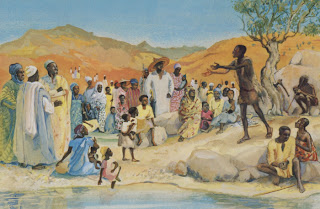 |
| John the Baptist preaching in the desert |
Isaiah 11:1-10
Romans 15:4-13
Matthew 3:1-12
Psalm 72:1-7, 18-19
The traditional color for the Season of Advent is purple. Increasingly, however, blue is used as an alternative, and this reflects a significant change in thinking, a change embodied in the Revised Common Lectionary. In part Advent is like Lent – a penitential season when our thoughts should be focused on the great, but awesome, themes of sin and redemption. In Cranmer’s original Book of Common Prayer, and in the versions that followed for many centuries, the Sunday lessons throughout Advent had the “Last Things” as their unifying theme – death, judgment and the Second Coming of Christ.
In the Revised Common Lectionary, by contrast, on the last Sunday in Advent we switch from death to birth, when the Gospel of the day begins the Christmas story. This is not mere convenience. This year’s Gospel for the second Sunday of Advent demonstrates just how closely the Second Coming and the First are connected. John the Baptist, warns his hearers of judgment in the sternest language -- "You brood of vipers! Who warned you to flee from the wrath to come?” – and he urges them to repent because “the kingdom of God is at hand”. This is the stuff of the Second Coming and of old-style Advent. But then, almost immediately, he turns their attention to the First Coming when he tells them that “one who is more powerful than I is coming after me”.
The fact is, God’s time is not our time. Strictly, in the eternal God there is neither ‘before’ nor ‘after’. Incarnation and Judgment are two sides of a single divine act. The ‘baby in the manger’ is at one and very the same time ‘Christ in his glorious majesty’. The trouble, though, is that we have become so comfortable with the homely image of the baby, we need several weeks to remind us that his coming is a challenge to much that we hold dear.
John cautions his hearers against spiritual complacency – “Do not presume to say to yourselves, `We have Abraham as our ancestor'; for I tell you, God is able from these stones to raise up children to Abraham”. As Christmas approaches, this message is apposite for us too. God doesn’t need us; we need God.
